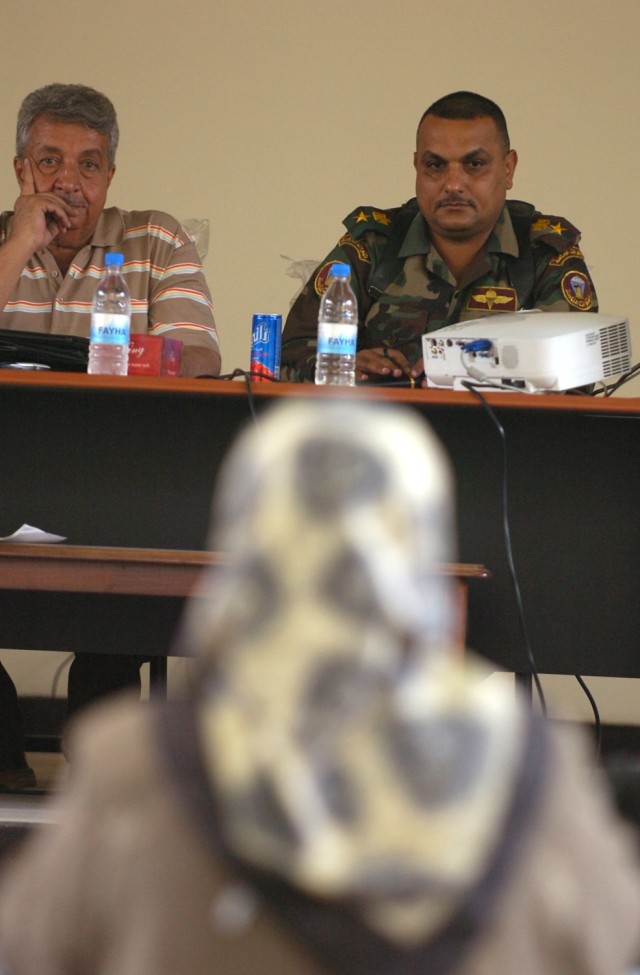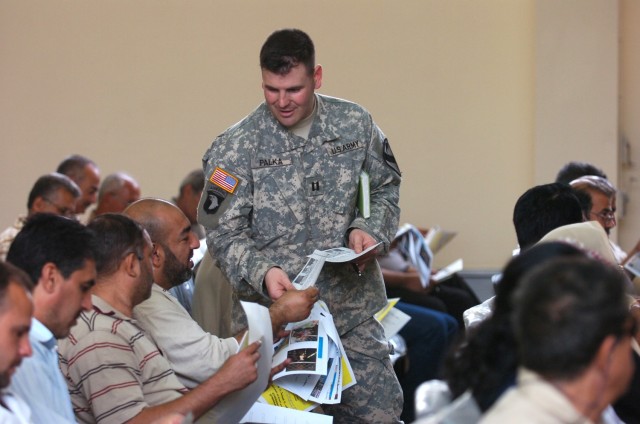BAGHDAD - During Saddam Hussein's regime, complaining or brining up problems to the government usually didn't harvest the desired effect. Then it could have meant death for the person and his family who brought the claim against the tyrannical regime.
That has changed.A,A
Residents, local council members, governmental office holders and business owners of the Karkh District have now come together on two separate occasions to hold town hall meetings in order to familiarize people to their local and national leaders and discuss just what they want and need from the people they elected.
"We are in this position because the people elected us," said Shatha Al Aobeidi, member of the Baghdad City Council and the Association of Iraqi Businesswomen. "Meeting like this is the beginning of the democratic process and everything in the neighborhoods. These are freedoms we the people have never had before."
One resident of the meeting in Kindi was Qais Al Shkarachi. He and his wife, Wasan, have lived in the area for more than 20 years. During Saddam Hussein's regime, Shkarachi and many other residents were not allowed to gather or talk freely about problems in their neighborhood.
Now, he has the freedom to not only work as the chairman of the college of engineering, but to be involved in a local government that can only improve what he calls the "best neighborhood in Baghdad."
Shkarachi said he believes that having a forum like this makes many things possible. Not only was he able to talk about projects that were already completed, he was able to get information on future projects.
"The neighborhood is already better than it was just five months ago," he said. "We have to look into the future and continue the progress we've made."
Shkarachi said that his neighborhood is one of the best for many reasons. They have strong ties with their security forces, both Iraqi and American, and after months of violence last winter, the people have taken it upon themselves to keep the area free of terrorists by forming neighborhood watch groups.
Shkarachi and his wife were among more than 100 other residents who came to the auditorium to discuss important issues. Raad Al Haris, the senior deputy minister of electricity, was one of several speakers who came to address the questions asked by the attendees.
"We are working to improve electricity distribution, establish a local office and support the neighborhoods with generators and wire for their homes and businesses," he said. "This forum is a good way for people to talk directly to us to help identify problems and requirements so we can give we can to this neighborhood."
According to Lt. Col. Patrick Matlock, commander 4th Squadron, 9th Cavalry Regiment, 2nd Brigade Combat Team, 1st Cavalry Division, parts of the district are now receiving 18 to 21 hours of electricity a day thanks to efforts by the local councils.
The second meeting was held in a similar location in Salhiya. Again, more than 100 residents attended and took full advantage of the opportunity to talk to local leaders about essential services like water, electricity and fuel.
Both meetings were held near refurbished schools. The school projects, known as "Operation: Dark Horse Diploma" have been a strong example of progress made in the area now that eight different schools have had makeovers thanks to cooperation between troops from 4-9 and local leaders aiming for improvements.
Matlock believes that progress will continue despite his unit leaving in a few months. He said momentum and a strong local government will help make the transition almost seamless once the Black Jack Brigade is replaced later this year.
"Once given the resources by the provincial and national government, this community will continue to improve even once we leave," he said.
Just before the meetings kicked off, fliers were handed out with information on reconciliation projects, women's assistance programs and information on an upcoming job fair aimed at further reducing the unemployment rate in the area.








Social Sharing